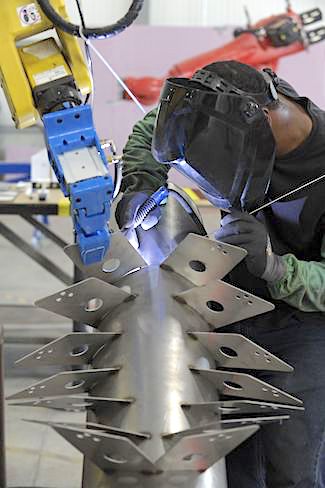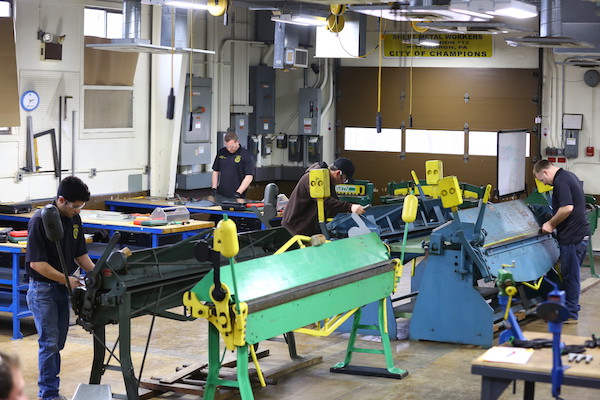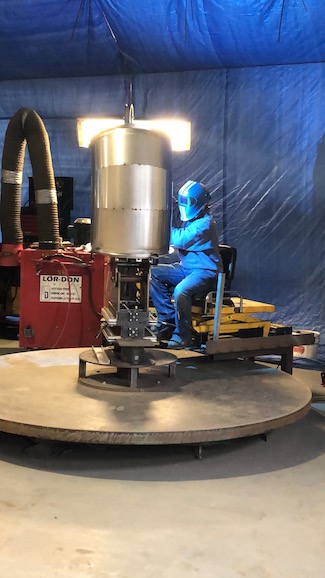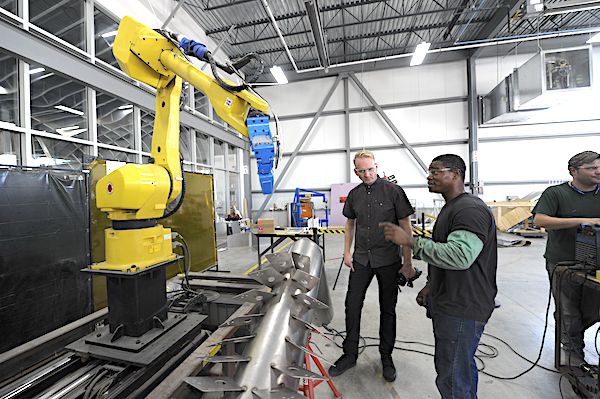Around the time you start thinking about the rest of your life, Seth Michael was seriously considering becoming a police officer. “In high school, I took two years of criminal justice classes and thought I wanted to become a police officer. Toward the end of my senior year, I realized I didn’t have a passion for police work, nor was that what I wanted to do the rest of my life. By then I realized I wanted to work with my hands, and heard about Vincennes University and their welding degree. I took a leap of faith and entered their program,” says Michael, who graduated with a degree in welding technology in 2018.

Seth Michael
Michael’s first welding job out of college was with a company that was low paying and non-union. “I realized it was not a good career choice for me in the long run. That is when I started researching various trades in Northwest Indiana,” says Michaels, who is currently paving his career path as an apprentice welder at Vidimos Inc., a union sheet metal shop established in 1945 in East Chicago, Ind., a contractor member of the Sheet Metal and Air Conditioning Contractors’ National Association (SMACNA), and a member of Sheet Metal Workers Local 20.

A SMACNA-member contractor works on a welding job.
There are many benefits to joining the trade, says Michael. “Good starting wages with about a $2-an-hour increase every six months while in the apprentice program, finishing with a minimum hourly wage of $43 after five-year apprenticeship program.” Michael also highlights a good pension, 401A, and health insurance. “One of the most important benefits is that my union is there to represent and train me as a member of the Local 20, Sheet Metal Workers,” says Michael.
In addition to the invaluable training through the Local 20, Michael draws knowledge from SMACNA, of which his employer is a member. “Knowledge is powerful. Sheet metal work is creative and fast-paced with cutting-edge technologies such as material removal automation that are helping shape the future of the industry. It is important to stay at the forefront in order to grow in your career, but to also learn and practice in-demand skills that set sheet metal workers apart from other tradespersons,” says Jeff Henriksen, executive director of communications at SMACNA.

A sheet metal shop in Pittsburgh.
Making sure a job is professionally completed is critical and there are no better trained or skilled workers than the signatory sheet trade. “Every single worker on a SMACNA contractor’s jobsite is highly qualified, and they all received the same four years of training. That provides many general contractors, builders and developers with greater peace of mind,” continues Henriksen.
Michael loves that he is constantly learning while on the job and through the apprentice class. “I love the journeymen that I get to work with on a day-to-day basis, and the knowledge I gain from them. I get to see and do new things every day, and I can see myself in this trade until retirement.”
 Refreshing to hear, for sure, especially with the aging workforce top of mind within the industry. “Workforce development initiatives like Ignite Your Career are a great opportunity to build awareness of rewarding career opportunities. It is important to attract and retain the best candidates, showing the valuable benefits of establishing a career in sheet metal—which is one of the highest salaried trades,” says Henriksen.
Refreshing to hear, for sure, especially with the aging workforce top of mind within the industry. “Workforce development initiatives like Ignite Your Career are a great opportunity to build awareness of rewarding career opportunities. It is important to attract and retain the best candidates, showing the valuable benefits of establishing a career in sheet metal—which is one of the highest salaried trades,” says Henriksen.
Ignite Your Career is one piece of SMACNA’s larger workforce development initiative designed to promote the advantages of working in the sheet metal industry and supporting our members in recruitment efforts. It stemmed from recognizing a need to address the aging workforce and it has been a continued priority for SMACNA. The site itself, IgniteYourCareer.com, launched earlier this year and is a valuable resource for supporting recruitment needs of our members and helping those interested in the trade learn more about career opportunities.
Related, SMACNA and SMART (the International Association of Sheet Metal, Air, Rail and Transportation Workers) jointly own and run more than 130 training centers across the country as part of a Registered Apprenticeship Program (RAP) that enables people to receive cost-free training while working in the industry. “The equipment in each training center may vary slightly by location, but to be a RAP, you have to register and have your national training program approved by the Department of Labor. This provides our members who graduate with the ability to take their skills anywhere in the country and be qualified to work for SMACNA Contractors,” says Henriksen.

A SMACNA contractor asks questions regarding the robotic equipment.
All the apprenticeship programs allow people to enter the sheet metal trade, earn while they learn and leave debt-free with opportunities to grow their career and earn a great living. Typically, apprenticeship programs see 15,000 people in the apprenticeship program at any one time. “Upon graduation, they become a journeyperson, earning around $90,000 per year, after serving as an apprentice for four to five years during which time they earn more than $250,000—a substantial difference from those that choose the college route and end up in debt with no guarantee of a well-paying job,” says Henriksen.
For Michael, he continues to work on his apprenticeship, even through COVID. “Thankfully, I have been working throughout COVID, and although work has been slow here and there, I’ve been maintaining a regular work schedule of 40 hours a week. With little social opportunities outside of work, I’ve been able to be more focused on my apprentice class and my tasks at work,” says Michael.
SMACNA is an association of Signatory sheet metal contractors, so if a sheet metal contractor wants to become a union shop, they are welcome to contact the association to begin that process. Those interested in the apprenticeship program can contact the International Training Institute (ITI) jointly run by SMACNA and SMART. Call SMACNA at 703-803-2980 or email memberservices@smacna.org. Call ITI at 703-739-7200 or visit https://www.sheetmetal-iti.org/.



